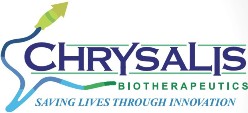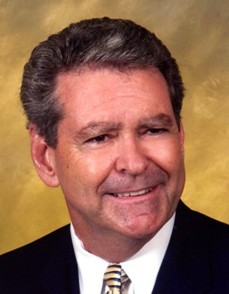|
Chrysalis BioTherapeutics, Inc. |
||
|
November 4, 2013 Issue |
||
|
The Most Powerful Name In Corporate News and Information |
||
|
Safe, Effective Drugs for Regenerative Peptide Stimulation |
||
|
Chrysalis
BioTherapeutics, Inc. is a privately held mid-stage biopharmaceutical
company developing a novel platform of regenerative thrombin peptide drugs.
The goal of Chrysalis BioTherapeutics is to develop safe and effective drugs
that stimulate the body’s natural regenerative processes to save lives and
improve quality-of-life for millions of people Chrysalis BioTherapeutics
lead drug product is Chrysalin® (TP508, rousalatide acetate), which was
originally developed by Dr. Darrell Carney at the University of Texas
Medical Branch to stimulate tissue repair and regeneration. Chrysalis
BioTherapeutics, Inc. is developing Chrysalin to mitigate effects of nuclear
radiation and unwanted side effects of radiation therapy and low-dose
radiation exposure.
Dr. Carney
recently founded Chrysalis BioTherapeutics, Inc. to develop drug products to
mitigate effects of radiation exposure. This relatively new company has
raised over $5 million in non-dilutive funding, and demonstrated that its
lead product, Chrysalin®, increases survival when injected 24 hours after
lethal radiation exposure and protects normal tissues from damaging effects
of radiation therapy. Based on new discoveries showing that Chrysalin®
stimulates stem cells within tissues, Chrysalis BioTherapeutics is exploring
opportunities for development of Chrysalin® products for tissue
regeneration, cardiovascular disease, and neurodegenerative diseases. |
BioTherapeutics
Chrysalis BioTherapeutics, Inc. Galveston, TX 77550 409.497.4083
Chrysalis BioTherapeutics, Inc. Print Version
|
|
|
Interview conducted by: Lynn Fosse, Senior Editor, CEOCFO Magazine, Published – November 4, 2013
CEOCFO: Dr. Carney, what is the concept behind Chrysalis BioTherapeutics? Dr. Carney: The company was established to develop a specific group of regenerative peptides that stimulate tissue repair and revascularization, and determine whether these peptides can protect normal tissues from damaging effects of radiation. Initially, we looked at the effect of our lead drug candidate, Chrysalin® to determine if it could mitigate effects of nuclear radiation exposure similar to what a person could experience from a nuclear leak, a nuclear reactor explosion, or a nuclear detonation.
CEOCFO: Why was this the first target you looked at when these peptides have promise in other areas as well? Dr. Carney: There is increasing concern that there might be a major nuclear leak or nuclear explosion somewhere in the world, yet we do not have effective medicinal countermeasures to protect citizens and emergency personnel from this type of exposure. We were asked by individuals at NIH whether Chrysalin could increase survival after nuclear exposure or nuclear exposure combined with injury. Based on the regenerative properties of our drug, we anticipated that Chrysalin could repair tissues after radiation exposure, but at that time we really had no way of knowing if Chrysalin treatment would also increase survival.
CEOCFO: What have you found so far? Dr. Carney: We have found that if you inject this peptide drug into an animal twenty-four hours after it is exposed to a lethal dose of radiation, the peptide mitigates the effects of radiation and significantly increases survival. The amazing thing was that we were increasing survival with just a single treatment of peptide twenty-four hours after the lethal exposure.
CEOCFO: Twenty-four hours seems like a lot of time to get help to people! Dr. Carney: That is the point. If there were a nuclear detonation disaster, it is quite likely that it would take perhaps twenty-four hours to be able to deliver a drug to people. So, that is the bar that has been set by funding agencies for those who wish to look for a nuclear radiation medicinal countermeasure.
CEOCFO: What is the science involved with how it actually works? Dr. Carney: This is an amazing bit of science. Thrombin is the enzyme that causes blood to clot every time you cut yourself. The peptide drug that we are working with, Chrysalin, is a part of that thrombin molecule. Every time a person is injured, this molecule is released and initiates the tissue regeneration and tissue repair process. In wounds and in almost any tissue, this will start the repair process and increase the blood vessel growth back into the tissue. It revascularizes the tissue, and what we have found is that it also activates the progenitor stem cells that are within that tissue to regenerate normal, functional, tissue. This is a very natural wound tissue regeneration process that occurs basically every time a person is injured. What we have done is taken a piece of that molecule that can activate the natural repair process and stimulate those progenitor stem cells to repair the tissue or protect the tissue form the damaging effects of radiation. A number of companies are excited about stem cell therapies. You can think of Chrysalin as a next generation drug that can stimulate the body’s own natural stem cells to regenerate tissue, rather than isolating stem cells and injecting them back into damaged tissue for this purpose.
CEOCFO: Where are you today? I know you recently received $1.5 million from the National Cancer Institute. What are the next steps that the funding will help facilitate? Dr. Carney: This is a project that we began with funding from the National Cancer Institute almost two years ago. In these studies, we discovered that the peptide could protect regions of the brain and stimulate neurogenesis following radiation therapy. For the next phase of this project, we will determine whether the Chrysalin-induced neural protection and regeneration relates to increasing the learning capacity and cognitive function of the brain and better understand how the drug protects these neural progenitor stem cells.
CEOCFO: Do you anticipate that the funding will get you where you need to be? Dr. Carney: We have been able in the last two and a half years to raise about five and a half million dollars in non-dilutive grants and contracts. This is taking us well into product development for mitigating effects of nuclear radiation and preventing radiation-induced normal tissue damage. I think we are now at a point where we need Series A financing to move into human clinical trials.
CEOCFO: Do you have any programs going on in addition to the radiation? Dr. Carney: The radiation is our focus at this point. We have two other areas where we are exploring opportunities. One is in tissue regeneration. We have completed clinical studies in diabetic foot ulcers and fracture repair. With what we now know, it is possible to move rapidly toward pivotal clinical trials. However, due to the cost of these trials, we need to raise a significant amount of money or partner with another company. The second area is in cardiovascular. We have very strong data from preclinical studies suggesting that Chrysalin could be developed to prevent people from dying from myocardial infarction. Again, we need to put significant dollars into this area and think that the cardiovascular area is probably best dealt with by partnering with a bigger pharma company. We are just beginning to pursue this possibility.
CEOCFO: I know that you developed this originally. What has surprised you the most as you continue to do testing and work on the development? Dr. Carney: I think the biggest surprise is that with a single topical application or a single injection at the time of the radiation therapy, we are affecting the development of the brain three months later. This molecule can set in motion a regenerative program that brings about major changes in tissue repair or in restoration of function several months later. From a biological standpoint, that was pretty surprising to us. It also speaks to the power of this particular drug.
CEOCFO: What is next on your timetable? Dr. Carney: One of our challenges is delivery of the drug for particular indications. If we are talking about the potential stockpiling of this drug by the government to be used in the case of a nuclear disaster. We need to be able to distribute it to hundreds of thousands of people who might be affected by a nuclear disaster in a formulation that could be self-administered. The hope is that we would never have that kind of a nuclear disaster. Therefore, we also believe that we can use this drug to protect the normal tissues and improve the quality of life for the millions of cancer patients that have radiation therapy, whether it is in the brain or other tissues in the body. That is a little more practical.
CEOCFO: These are very exciting times! Dr. Carney: I think this is a challenge, but we are pretty amazed at the data that continues to be very positive.
CEOCFO: Why should people in the business and investment community pay attention to Chrysalis Bio Therapeutics? Dr. Carney: I think Chrysalis provides a unique opportunity for investment or partnering with tremendous upside potential because we have a drug that has already been in human clinical trials and has been shown to be safe. Approximately 600 humans have been treated with Chrysalin without any drug-related adverse events. Moreover, GMP manufacturing is established. Therefore, we are now much farther along than most early stage companies. We also have the potential to have drugs on the market within three to five years for mitigating effects of nuclear radiation and unwanted effects of radiation therapy.
CEOCFO: Final thoughts?
Dr. Carney:
We hope to
initiate a Series A round of private or institutional investment later this
year or early next year. We would be glad to discuss investment or
partnering with interested parties. |
||
|
|
||
|
|
||
|
Pharmaceutical Development, Chrysalis BioTherapeutics, Inc., CEO Interviews 2013, Safe, Effective Drugs for Regenerative Peptide Stimulation, regenerative thrombin peptide drugs, Chrysalin®, TP508, rousalatide acetate, Drug Development Companies, Recent CEO Interview, Drug Development Stock, Pharmaceutical Stocks, drugs that stimulate the body’s natural regenerative processes, therapies that stimulate tissue repair and regeneration, drug to mitigate effects of nuclear radiation and unwanted side effects of radiation therapy and low-dose radiation exposure, Chrysalis BioTherapeutics, Inc. Press Releases, News, Companies looking for venture capital, Angel Investors, private companies looking for investors, drug development companies seeking investors, pharmaceutical development companies needing investment capital |
||

